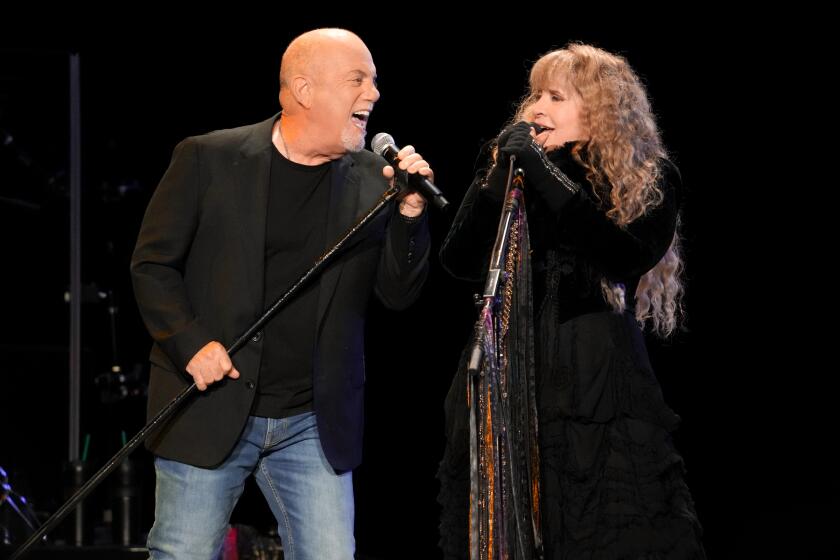Bobby Caldwell, smooth ‘What You Won’t Do for Love’ singer, dies at 71

- Share via
Bobby Caldwell, a blue-eyed soul singer whose smooth touch camouflaged his idiosyncrasies, died on Tuesday following a long illness. He was 71.
His wife Mary Caldwell announced his death on Twitter.
“What You Won’t Do For Love,” Caldwell’s lone Billboard Top 40 hit, is a defining single of late-1970s soft rock, occupying a place between mellow adult contemporary and sultry quiet storm R&B. Although Caldwell spent time writing songs for adult contemporary artists — he co-wrote “The Next Time I Fall,” a hit duet for Peter Cetera and Amy Grant in 1986 — he carved out a larger place in R&B than pop; early in his career, the white singer was often mistaken for Black due to his soulful phrasing and grooves. Although he was grounded in soul, fusion was Caldwell’s specialty. As his career progressed, he threaded in stronger elements of jazz, eventually becoming a fixture in contemporary jazz settings.

As Caldwell maintained a career as a smooth jazz musician, younger generations discovered rhythms and grooves lying in his albums from the 1970s and early 1980s. Initially sampled by Aaliyah on 1994’s “Age Ain’t Nothing But a Number,” “What You Won’t Do for Love” turned into a foundational sample in hip-hop after Tupac Shakur interpolated it on 1997’s “Do for Love.” It wasn’t the only Caldwell track to provide source material for rappers: Common sampled “Open Your Eyes” in 2000, while Lil Nas X recently sampled “Carry On.”
Kicking off a joint tour Friday night, the boomer icons played the hits and remembered a departed friend.
Caldwell dabbled in various jazz styles, including interpreting the great American songbook in the vein of Frank Sinatra. He continued in this vein until the late 2010s, when he put his career on hold to deal with the side effects of being “floxed,” a bad reaction to a fluoroquinolone antibiotic. The condition eventually led to his death.
Born in Manhattan on Aug. 15, 1951, Caldwell spent his childhood in Miami. Raised in a showbiz family — his parents hosted a musical variety show called “Suppertime” — Caldwell started playing guitar and piano as a teenager. He headed to Las Vegas, where he played originals and covers in a group called Katmandu, then relocated to Los Angeles when he got a gig playing guitar in Little Richard’s band during the singer’s comeback in the early 1970s.
After splitting with Little Richard, Caldwell ground out a living in L.A. but never managed to land a record deal. Dejected, Caldwell moved back to Miami in 1977. At that time, Miami was the unofficial disco capital of the world thanks in part to the music emanating from TK Records, a label that boasted KC and the Sunshine Band and Anita Ward among their acts. Caldwell made an overture to TK Records, and the label signed him within a couple of days.
TK Records hoped to pattern Bobby Caldwell after Boz Scaggs, a singer who’d just had a smash hit with his LP “Silk Degrees.” Caldwell recalled, “I think they saw me as their guy to usher in something with more of a pop approach to R&B music, without the pounding of a kick drum and the nonsensical disco lyrics.” He spent 10 months toiling over his debut, adding “What You Won’t Do For Love” at the last minute. Believing the song could be a hit, TK Records decided to release the single and its accompanying eponymous album without Caldwell’s picture on its cover, fearing that R&B radio wouldn’t play a white act.
The sleight-of-hand worked: Upon its 1978 release, “What You Won’t Do For Love” climbed into the Top 10 not only on Billboard’s Hot 100 but also on its R&B chart. In the wake of its success, Natalie Cole picked Bobby Caldwell as her support act. On the tour’s opening night, a scenario that would soon become familiar to Caldwell happened for the first time: “It’s the very first night in Cleveland, at an amphitheater. We’re talking about 7,000 brothers and sisters, and I was the only cracker there, and everyone is coming to hear ‘soul brother’ Bobby Caldwell. I walked out on stage and you could hear a pin drop, just a total hush came over the crowd. I stayed and delivered. After about 10 minutes, I had them in my pocket.”
Caldwell’s second album, 1980’s “Cat in the Hat,” earned another R&B hit with “Coming Down From Love.” TK Records folded in 1981, so Caldwell moved to Polydor for 1982’s “Carry On.” A year later, “August Moon” received a release only in Japan, a sign that his career momentum had stalled. Caldwell spent the mid-1980s concentrating on creating pop music for film soundtracks, which sometimes took him into curious territory: He wrote a pumping workout anthem called “Don’t Quit” for the fitness series “Body by Jake” and also recorded “Take Me, I’ll Follow You,” the theme song to “Mac and Me,” a 1988 ripoff of “E.T. The Extra-Terrestrial.” He also wrote songs for Chicago, Neil Diamond and Scaggs, among other adult contemporary-oriented singers. His biggest success as a songwriter was “The Next Time I Fall,” which Cetera and Grant took to No. 1 in 1986; it was also nominated for the Grammy Award for pop performance by a duo or group with vocals.
Capitalizing on the success of “The Next Time I Fall,” Caldwell released a bright soft-rock album called “Heart of Mine” in 1989. With its 1991 sequel “Stuck on You,” he began moving in a contemporary jazz direction, fusing old-fashioned crooning with smooth grooves. This blend became his signature over the ensuing decades. He’d occasionally shift direction — 1995’s “Soul Survivor” emphasized R&B, while 1999’s “Come Rain or Shine” tilted toward big band — yet he remained anchored in this lightly funky fusion.
During the 2000s, Caldwell remained a popular concert attraction, both on his own and as a part of the Vegas revue “The Rat Pack Is Back,” where he played Frank Sinatra. On record, he continued to alternate between standards and originals, working familiar territory until 2015, when he teamed with R&B producer Jack Splash, best known for his work with Alicia Keys and Solange Knowles on the album “Cool Uncle.”
Caldwell is survived by his wife, Mary, and two children from a previous marriage.
More to Read
The biggest entertainment stories
Get our big stories about Hollywood, film, television, music, arts, culture and more right in your inbox as soon as they publish.
You may occasionally receive promotional content from the Los Angeles Times.











